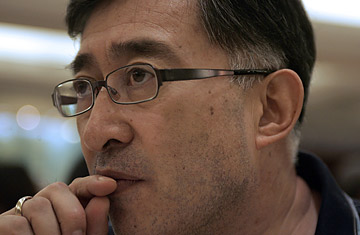
Khedroob Thondup nephew of the Dali Lama is shown in 2007.
"I was seven years old in 1959, and I was studying in Darjeeling," recalls Khedroop Thondop. "One day my teachers told me that I was to go and receive someone at the train station. That's when I realized that I was related to His Holiness and that I was Tibetan."
As the Dalai Lama's nephew, the eldest son of the Tibetan spiritual leader's eldest brother, Thondop, now 56, has already led an extraordinary life. He was born in Calcutta, where his father, a political leader in the Tibetan government, had been posted. He went to the elite St. Stephen's College in New Delhi, got an MBA in the United States, ran a family business for several years in New York City, and then returned to India in 1977 to serve as his uncle's special assistant. Two years later, he went to Beijing for Tibet's first negotiations with China, taking notes on the meetings between his father and Chinese supreme authority at the time, Deng Xiaoping. For the last 21 years, he has run a center for Tibetan refugees in Darjeeling and has served three terms in the Tibetan parliament-in-exile.
But perhaps the most extraordinary turn has been his recent conversion to the cause of full independence for Tibet — standing apart from both his father and the Dalai Lama. Thirty years of negotiation have been fruitless, he says, and China has not made any effort to acknowledge the demands of the Tibetan people for autonomy. "There is a generation's difference between my father and myself," he says. His father is an old-school diplomat, while Thondop isn't shy about openly criticizing the current Chinese leadership. He calls them "a bunch of cheats and liars" for denying that Deng was willing to put everything on the table except independence in those first negotiations. "I just can't forgive them," Thondop says. "We Tibetans will never be able to live under China." (See pictures of Tibet Under Chinese Rule.)
At this week's summit of Tibetan exiles, Thondop, a member of Tibet's "royal family", as one young admirer described him, has become a symbol of a generational shift among Tibetans toward support of a free Tibet. "He was there in the beginning," says Tenzin Tsundu, a pro-independence activist. "To hear his voice say that, it's a very emotional thing."
No one is expecting the 130,000 Tibetans in exile, or the 5.5 million in Tibet, to suddenly shift course away from the official position: the so-called Middle Path of negotiating for genuine autonomy while remaining part of China. Talking about independence can be taken as an implicit criticism of the Dalai Lama and thus considered taboo among many Tibetans, but this week's talks have brought those views into the mainstream. Leaders of the main pro-independence activist groups were invited to be among the 550 delegates, and their opinions will be incorporated into its final report. "Overall it was a very frank discussion," says Tenzin Choeying, president of Students for a Free Tibet.
Still, in conversations with the young activists during a break in today's proceedings, it was hard not to notice their disappointment. As the delegates' working groups presented their reports publicly, it quickly became clear that those supporting independence were still a small minority — about 20%, according to Thondop's own estimate. "People who speak for independence, there are not many," says Tsundu, whose red headband and fiery rhetoric has made him a minor celebrity among the activists here. He complained that the meeting itself was weighted toward the old guard, because most of the invitees were formally elected, not grass-roots leaders. "There is a huge discrepancy in the way the meeting was called," he says.
The best hope of the independence activists may be to try to influence the strategies of negotiation rather than call for a wholesale change in policy. "We have realized that in the area of non-violence, we have used only 45 methods, but there are 200," Choeying says. "Within Middle Path there can be confrontation." Even among those who support independence, there is some skepticism about whether pushing for it now would be wise. "I'm divided," says Tenzin Choegyal, a delegate from Brisbane, Australia. "I'm a youth who's for independence, but looking at the path that we should take. The realistic approach is better. The nations that have fought for their independence, they have shed a lot of blood, and we don't want that."
Thondop says he understands the impatience and ambivalence. But he counsels for the long view. "Do not think of what you're going to get right here," he says. "What you may get now may not be good enough for future generations."
